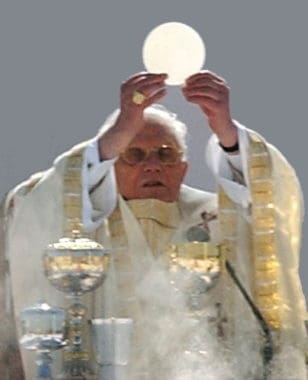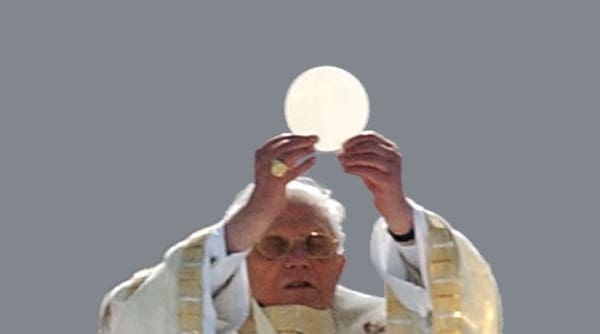Dear Father John, the Catechism of the Catholic Church teaches that it is a grave sin to miss our Sunday Obligation unless excused for a serious reason (CCC 2181). Our parish priests and our RCIA team have always taught the same. However, recently I heard someone from  the diocese say that it is never a mortal sin to miss Sunday’s Mass; that the Bishops of the United States have relaxed the old rule and if you miss Sunday’s Mass you can simply choose another daily Mass for your “Sabbath”. Could you clarify the Sunday Obligation, please?
the diocese say that it is never a mortal sin to miss Sunday’s Mass; that the Bishops of the United States have relaxed the old rule and if you miss Sunday’s Mass you can simply choose another daily Mass for your “Sabbath”. Could you clarify the Sunday Obligation, please?
Well, I’ll try. But first, a disclaimer. It is easy to misunderstand what people say. So the “someone from the diocese” may not have actually said that “it is never a mortal sin to miss Sunday’s Mass,” but they may have said something that was easily interpreted like that. So, since I wasn’t present and this may not be an exact quotation (or intention) of the person in question, I will simply try to reflect a bit on the Sunday obligation itself. Wait – one more disclaimer. We should remember that one of the great advantages of being a Catholic is that we can know when our pastor or priest (or even bishop) is wrong: all we have to do is refer to the Catechism and the teaching of the Magisterium. So, even if a diocesan representative did state something confusing, we don’t really have to get too upset by it (everyone can make mistakes); we just have to go back to our sources and stick to the truth ourselves.
Part I: The Sunday Obligation
First, let’s make very clear that attending Sunday Mass (on the Sunday or on the vigil) and Mass on Holy Days of Obligation is a primary responsibility of every Catholic.
The Catechism Says…
On the web page run by the United States Conference of Catholic Bishops, we can find the relevant numbers of the Catechism:
- (2180) The precept of the Church specifies the law of the Lord more precisely: “On Sundays and other holy days of obligation the faithful are bound to participate in the Mass.” “The precept of participating in the Mass is satisfied by assistance at a Mass which is celebrated anywhere in a Catholic rite either on the holy day or on the evening of the preceding day.”
- (2181) The Sunday Eucharist is the foundation and confirmation of all Christian practice. For this reason the faithful are obliged to participate in the Eucharist on days of obligation, unless excused for a serious reason (for example, illness, the care of infants) or dispensed by their own pastor. Those who deliberately fail in this obligation commit a grave sin.
On that same web page, there is a report on the bishops’ Catechism committee that correlates extensively quotations from Pope John Paul II’s 1998 Apostolic Letter, Dies Domini, and various numbers from the Catechism. Reading through the correlation is a fantastic way to meditate on the reasons behind the Sunday obligation. Here is one of the paragraphs from Dies Domini that the bishops’ committee cites – it’s language is a bit technical, but still quite clear:
Even if in the earliest times it was not judged necessary to be prescriptive, the church has not ceased to confirm this obligation of conscience, which rises from the inner need felt so strongly by the Christians of the first centuries. It was only later, faced with the halfheartedness or negligence of some, that the church had to make explicit the duty to attend Sunday Mass: More often than not this was done in the form of exhortation, but at times the church had to resort to specific canonical precepts. . . . The present code reiterates this, saying that ‘on Sundays and other Holy Days of obligation, the faithful are bound to attend Mass.’ This legislation has normally been understood as entailing a grave obligation: This is the teaching of the Catechism of the Catholic Church, and it is easy to understand why if we keep in mind how vital Sunday is for the Christian life (#47).
In the United States bishops’ own Adult Catechism, they emphasize the importance of Sunday Mass attendance: “God, through the Church, obliges us to make Sunday holy by participation in the Eucharist and by our being prayerfully reflective as far as possible.” (You can read the whole short chapter here.)
“Do not judge, or you too will be judged…” (Matthew 7:1)
Okay, so it’s pretty clear that the Sunday obligation is not optional, and that purposely snubbing God by skipping is indeed a grave sin. But remember, we are not called to judge our neighbors. We have to avoid falling into self-righteous Phariseeism in the face of Catholics who do not fulfill this responsibility. Instead of condemning them, we should reach out to them, help them to understand the many reasons behind this duty, and the many positive fruits that come from fulfilling it – which means we need to understand those reasons ourselves, and live Sunday well enough to begin experiencing some of those fruits.
Common Sense and Pastoral Sensitivity
John Paul II’s Apostolic Letter on this topic did address some challenges to living Sunday well that we face in post-modern times. This can cause some confusion. Basically, the issue has to do with working on Sundays. Our world no longer universally recognizes Sunday as the Lords’ Day. As a result, we Catholics, in order to keep our jobs, sometimes have to work on Sundays. Likewise, for those of us who do try to live the Lord’s Day well, some family and recreational activities that are perfectly in synch with the Sunday rest require other people to work – at restaurants or community swimming pools, for instance. How are we supposed to understand this apparent contradiction?
This challenge was one reason the Second Vatican Council authorized the vigil Mass (Mass on Saturday evening) to fulfill the Sunday obligation. And if a Catholic simply cannot make any of the Sunday Masses, he can speak with his local pastor to receive a dispensation from this obligation, and to work out alternative solutions.
As regards working on a day that is meant to be for rest, the Catechism blends common sense and pastoral sensitivity (#2187):
Sanctifying Sundays and holy days requires a common effort. Every Christian should avoid making unnecessary demands on others that would hinder them from observing the Lord’s Day. Traditional activities (sport, restaurants, etc.), and social necessities (public services, etc.), require some people to work on Sundays, but everyone should still take care to set aside sufficient time for leisure. With temperance and charity the faithful will see to it that they avoid the excesses and violence sometimes associated with popular leisure activities. In spite of economic constraints, public authorities should ensure citizens a time intended for rest and divine worship. Employers have a similar obligation toward their employees.
Having seen the reality and gravity of our duty as Catholics to participate in the Sunday liturgy and live the Lord’s Day meaningfully, we are ready to reflect a bit more deeply on the reasons why this is the case, which we will, in my next post.
Yours in Christ, Father John Bartunek, LC, ThD
+
Art for this post asking if Sunday Mass is still an obligation: Detail from Canonization ceremony of Brazilian Friar Frei Galvão celebrated by Pope Benedict XVI at the Campo de Marte, in Sao Paulo, Brazil, Fabio Pozzebom/ABr, 11 May 2007, CCA 3.0 Brazil, Wikimedia Commons.


